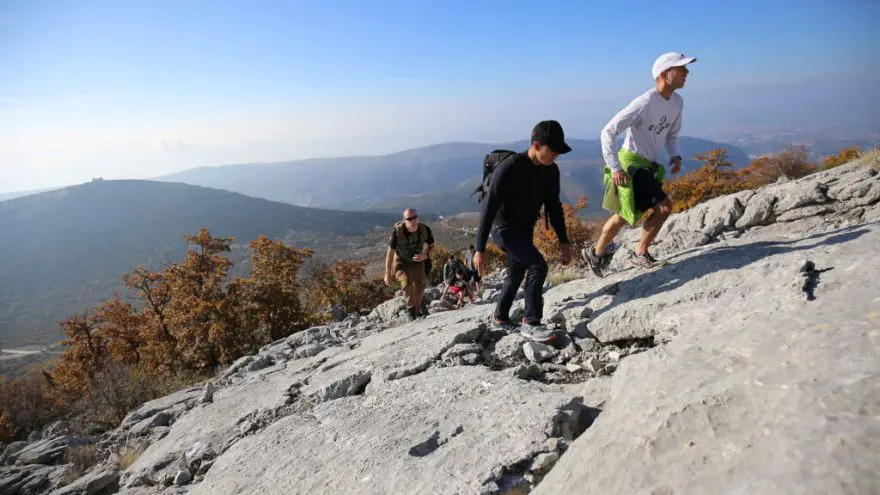How Many Calories Does Hiking Burn?
 How Many Calories Does Hiking Burn?
gearweare.net
How Many Calories Does Hiking Burn?
gearweare.net
Whether you’re worried about losing weight, building muscle, or how much food you need to consume, knowing the number of calories burned hiking is important.
There are a few factors that affect how many calories you burn, including body weight, fitness level, energy expenditure, gender, pace/hiking speed, incline, type of hike and how heavy your backpack is.
All in all, this article will give you a general idea and guidelines for your next excursion.
Table of Contents
Is Hiking a Good Way to Burn Calories?
Absolutely. Just about any activity that gets your body moving for an extended period of time is ideal for weight loss. Luckily, hiking also brings you to beautiful places and doesn’t tend to feel like pure exercise.
There are many different trails and terrains that will help you lose weight quickly or at a more moderate pace. The number of calories burned hiking is ultimately up to you and how much you challenge yourself.
How Many Calories Are Burned Hiking?
As I mentioned, many factors come into play when discussing the calories you burn hiking. Let’s break it down by gender.
First, let’s assume you are a 120-pound female. If you carry around 20 pounds in your pack (which isn’t difficult with a sufficient amount of water) on a slight incline, you will burn approximately 125 calories per mile. That makes 625 calories in five miles and 1,250 calories in ten miles.
Now, assuming you are a 200-pound man, you can hike the same trail and burn more calories with the same pack. A male will burn about 200 calories per mile. Bringing us to 1,000 calories in five miles and 2,000 calories in ten miles. While it doesn’t seem fair, men tend to burn a higher amount of calories because they usually have more muscle than body fat than women.
To increase your caloric burn, you can take a different trail, use heavier pack weight, walk faster, and of course, walk for longer.
Is It Okay to Hike Every Day?
As a beginner, this could be pretty taxing on your body. If you are a more experienced hiker, it is okay to hike every day as long as you know your limits.
Not only is it just okay, but it’s great for your physical and mental health. Hiking has been proven to improve cardiovascular health, strengthen muscles, lose weight, and reduce stress.
Is Hiking a Cardio or Strength Exercise?
Surprise, it’s both! While walking is primarily a cardio exercise, the terrains you encounter hiking require you to use the muscles in your legs when going uphill, your core muscles for balance, and sometimes even your arms if you need to scramble.
What Muscles Do You Use Hiking Uphill?
Quite a few. When hiking uphill, you engage muscles in the lower half of your body. You will likely be sore in your quads, glutes, hamstrings, knees, and calves.
On the way down, you will engage a different set of muscles. Downhill hiking engages the muscles in your hips, ankles, and feet.
Why Am I Gaining Weight From Hiking?
Perhaps you have been hiking regularly for a couple of months now. You feel good, look good, but weigh more than when you started. Don’t worry – you are not alone.
Most people gain weight from the increase in muscle mass. Working your leg muscles the way you do outdoors increases your calories burned hiking and works your muscles intensely.
When you are stepping on the scale, you might also be carrying some water weight. If you eat a lot of carbohydrates on the trail, these will cause your body to hold onto excess water, therefore tipping the scale.
Finally, it could possibly be from plain old overeating on and off the trail or eating the wrong foods. Even though you are burning a ton of calories, it doesn’t exactly mean that a cheesy hamburger or pizza is okay to eat afterward.
What Type of Food Should I Bring Hiking?
Because you are likely to be on the trail for at least a few hours, you should bring food that provides you with energy without weighing you down. While sugars might be tempting, they will give you a quick energy rush and then leave you feeling lethargic.
Instead, bring fresh or dried fruits, dried meat, cheese, nuts, or even a sandwich for a longer trek. These foods have complex carbohydrates and are high in protein. Of course, something you can’t forget is water… and enough of it. Staying hydrated is key.
Is Hiking Better Than the Gym?
As you can see from the number of calories burned hiking, it is a great full-body/aerobic physical activity. Depending on what type of results you are looking for, it might be better than the gym.
Hiking will help you lose fat, tone your muscles, and increase endurance. For many people, hiking is much more enjoyable than exercising indoors. It allows you to connect with nature, listen to the wind and the birds, and relax your mind.
Conclusion
Without a doubt, hiking is a great form of exercise with many health benefits. The next time you begin to wonder, “how many calories are burned hiking?” you can refer back to this article.
As you’ve learned, the number of calories burned hiking depends on a few things, but on a 10-mile hike, you’re likely to burn between 1,250-2,000 calories – not to mention the muscles you’ll build.











